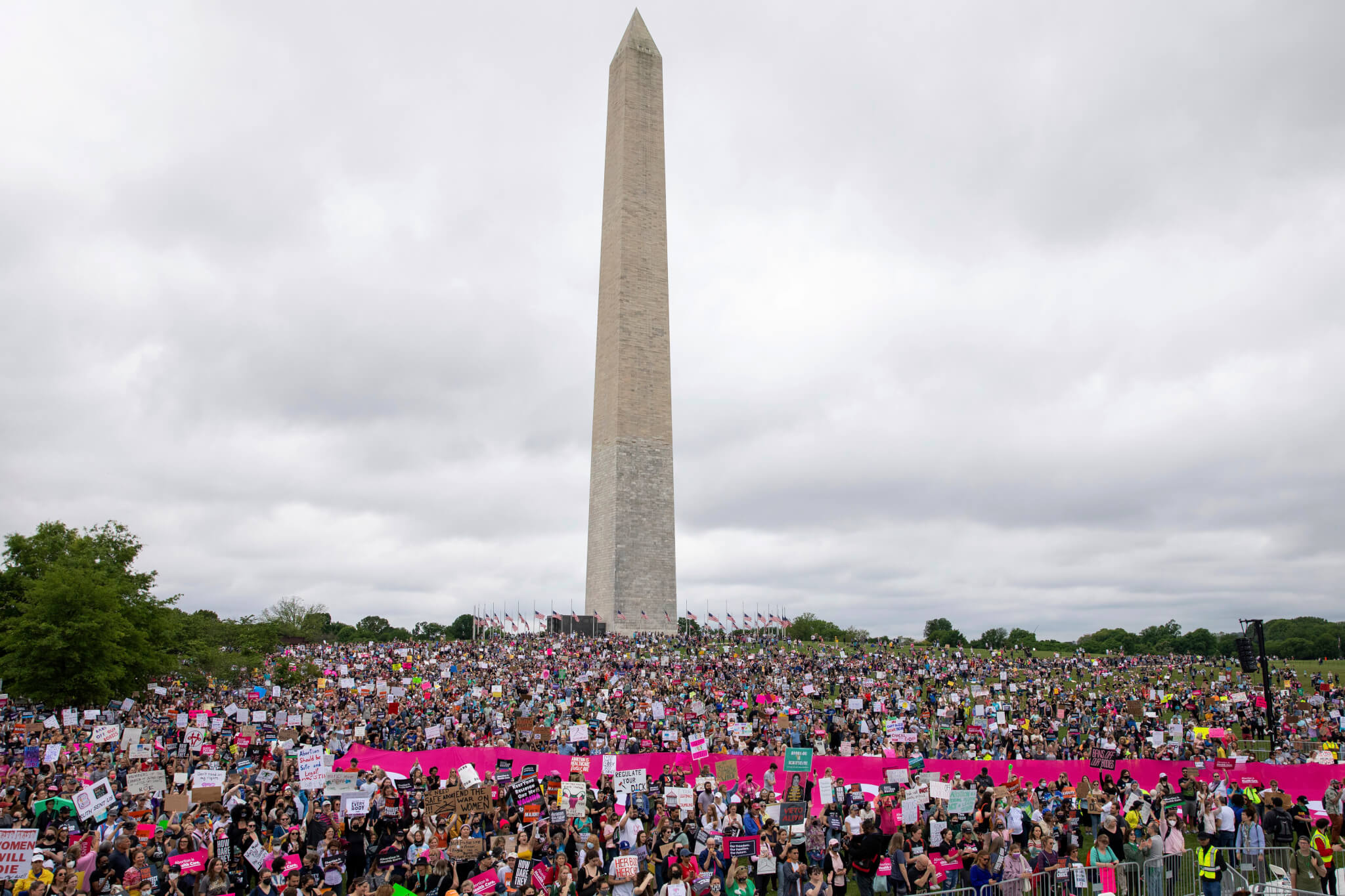
Abortion rights demonstrators rally on the National Mall in Washington, during protests across the country, on Saturday, May 14, 2022. (AP Photo/Amanda Andrade-Rhoades)
According to a new Courier Newsroom/Data for Progress poll, 68% of likely voters oppose a national ban on abortion. The survey also found that 47% of likely voters said they felt “worried” about recent developments around abortion, while more than four in 10 reported feeling “angry” or “sad.”
Sixty-eight percent of likely voters across the country, including majorities of Independents and Republicans, said they oppose a national ban on abortion, with 55% saying they “strongly oppose” it. Only 24% of likely voters would support such a ban, making it a deeply unpopular idea.
And yet, Republicans may pursue it anyway if the US Supreme Court strikes down Roe v. Wade—as a leaked draft opinion suggests they will.
If Roe were to be struck down, it would once again allow states to ban abortion. In Virginia, abortion will remain accessible, but without legal protection. Jamie Lockhart, executive director of Planned Parenthood Advocates of Virginia, noted that Virginia is one state senate seat away from an abortion ban reaching Gov. Glenn Youngkin’s desk to be signed.
Across the country, meanwhile, there will be a patchwork of 50 states with 50 different abortion laws—unless, of course, the federal government bans abortion, which is very much on the table.
Sen. Minority Leader Mitch McConnell recently told USA Today that if the Court did ultimately strike down Roe, it’s “possible” that a Republican-led federal government could ban abortion nationwide.
“If the leaked opinion became the final opinion, legislative bodies—not only at the state level but at the federal level—certainly could legislate in that area,” McConnell said. “If this were the final decision, that was the point that it should be resolved one way or another in the legislative process. So yeah, it’s possible. It would depend on where the votes were.”
In the interview, McConnell also implicitly said it was “pretty clear where Senate Republicans stand” on abortion: they’re against it.
“The draft Supreme Court ruling overturning Roe v. Wade would turn back the clock 50 years on women’s rights, which is unacceptable. Access to safe, legal abortion is health care, and closely tied to economic freedom, yet this constitutionally-protected right has been under attack for decades by politicians who want to control women’s bodies,” said Rep. Don Beyer.
Beyer also noted that there are states already trying to pass laws to prosecute women who have abortions for murder, as Republicans in Congress have discussed a federal ban to outlaw abortion entirely in the United states if they can win control of the Senate.
“The decision would also imperil other civil liberties, including marriage equality and access to contraception. In Virginia, the right to choose is protected by a narrow majority. Americans broadly support choice, and an extreme, politically-motivated ruling by the right wing of the Supreme Court would do lasting damage to perceptions of the Court,” Beyer said.
The most powerful anti-abortion groups have also been explicit that they plan to push for a total ban on abortion nationwide if Republicans take back control of the White House, House, and Senate in 2024. According to the Washington Post, a group of Republican Senators has even discussed introducing a bill to ban abortion at around six weeks, before many women even know they’re pregnant.
The Biden administration has also sought to make clear the risk that a Republican-led government could outlaw abortion.
“I think we’re at serious risk,” since-departed White House press secretary Jen Psaki said earlier this month. “Mitch McConnell and other Republicans in Congress are talking about a national ban on a woman’s right to choose.”
Democrats have also tried to pass their own bill to codify the right to abortion into federal law. The Women’s Health Protection Act would guarantee abortion access free from medically unnecessary restrictions, limitations, and bans that delay, and at times, completely obstruct, access to abortion. If the proposal were to become law, it would effectively render the Supreme Court’s decision moot and override any state laws banning or restricting abortion access, guaranteeing access to care nationwide.
The House passed the Women’s Health Protection Act earlier this year, but the bill failed in the Senate, as only 49 Senators—including Virginia Sens. Tim Kaine and Mark Warner—voted to open debate on the legislation, far shy of the 60 votes needed.
The poll also found that voters are feeling unhappy about recent developments around abortion, such as the SCOTUS leak, the possibility of a national ban and state bans on abortion that don’t include exceptions for rape or incest.
When asked to choose up to three emotions to describe how they felt about recent developments around abortion, nearly half (47%) of respondents said they felt “worried,” while more than four in 10 reported feeling “angry” or “sad.” The negative feelings were mostly reported by Democrats and independents.
Republican voters, meanwhile, did not report any feelings—either positive or negative—in high numbers. Twenty-nine percent of Republican respondents said they felt “worried,” while 27% reported feeling “sad.”
The numbers were even lower on the positive emotion side of the ledger. Only 13% of Republican likely voters said the recent developments around abortion made them feel “happy,” while one out of every four Republican voters said it made them feel “hopeful.”
Voters also expressed concern about the legitimacy of the conservative-controlled Supreme Court. Nearly half (48%) of respondents—including 69% of Democrats—said that overturning Roe would weaken the court’s legitimacy. Only 21% of likely voters said striking down Roe would strengthen the Court’s legitimacy and 31% said it would make no difference.
Methodology: From May 13 to 17, 2022, Data for Progress conducted a survey of 1,109 likely voters nationally using web panel respondents. The sample was weighted to be representative of likely voters by age, gender, education, race, and voting history. The survey was conducted in English. The margin of error is ±3 percentage points.

VIDEO: Your support matters!
Your support matters! Donate today. @vadogwoodnews Your support matters! Visit our link in bio to donate today. #virginianews #virginia #community...

Op-Ed: Virginia’s new Democratic majorities pass key bills to improve your lives, but will Youngkin sign them?
The 2024 Virginia General Assembly regular session has wrapped up. It was a peculiar session from the outset, with Democratic majorities in the...

Op-Ed: Why Virginia Needs A Constitutional Amendment Protecting Reproductive Freedom
Virginia’s recent election season in 2023 drew in eyes from all over the country. Reproductive freedom was on the line and Virginia remained the...

From the state rock to the state flower, here’s how Virginia got its symbols
Have you ever wondered why the Dogwood is the state flower? Or how the cardinal became the state bird? We’re here to answer those questions and more...

VIDEO: Second-gentleman Douglas Emhoff gives speech on reproductive freedom
Second gentleman, Douglas Emhoff touched on reproductive freedom not only being a woman's issue but "an everyone's issue" during the Biden-Harris...

Glenn Youngkin and the terrible, horrible, no good, very bad night
Election Day 2023 has come and gone, and while there are votes to be counted, one thing is perfectly clear: Virginians unequivocally rejected Gov....





